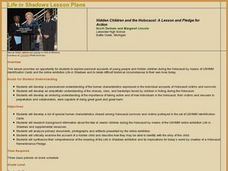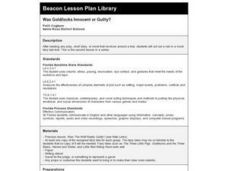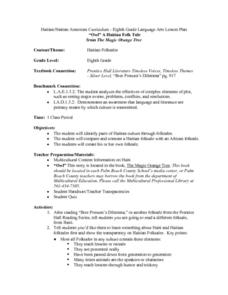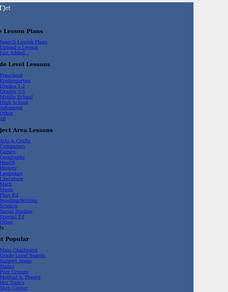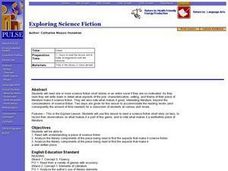Curated OER
Evolving Views about Minority Rights in the United States
Tenth graders compare and contrast majority and minority outlooks on issues. In this social justice lesson, 10th graders research majority and minority values regarding the Salem Witch Trials, Plessy v. Ferguson, the McCarthy hearings,...
Curated OER
Hidden Children and the Holocaust: A Lesson and Pledge for Action
Students read various personal accounts of children during the Holocaust. Using special identification cards, they relate the Holocaust to historical events in their lifetimes. Examining primary source documents, they describe how they...
Curated OER
Martin Luther King, Jr., and the Power of Nonviolence
Middle schoolers examine the philosophy of nonviolence developed by Martin Luther King, Jr. and how this turned into practice during the Civil Rights Movement. They compare these teachings to those of Mohandas K. Ghandi.
Curated OER
Was Goldilocks Innocent or Guilty?
Fourth graders act out a mock fairy tale trial. They use a fairy tale like "The Three Little Pigs", "Goldilocks and the Three Bears", "Hansel and Grete"l, and/or "Little Red Riding Hood".
Curated OER
Immigration in the United States
Students explore how recent immigration and migration patterns impact social and political issues. They apply affective learning techniques
Curated OER
"Owl" A Haitian Folk Tale
Eighth graders read and discuss the Haitian folktale, "Owl." They compare it to the story, "Brer Possum's Dilemma," using a Venn diagram to show how they are different and alike. In groups, they retell the story in a skit format.
Curated OER
Is That Fair: What is Fairness?
Young scholars discover the meaning of fairness. In this character education instructional activity, students create their own meanings of fairness and compare them to their classmates' definitions. The young scholars discuss fairness...
Curated OER
Who Started World War I?
Students debate which power was responsible for the outbreak of World War I. In this cause and effects lesson, students research the causes of the outbreak of World War I on ProQuest in preparation for a (limited) reenactment of the...
Curated OER
Panther Exam: Writing a Play
Students demonstrate their knowledge of panthers by writing a play on the subject. In this animal life lesson, students view a slide-show on school computers of a veterinary exam of a panther. Students utilize this scenario to write a...
Curated OER
George Washington: First in War, First in Peace, and First in the Hearts of His Countrymen
Learners interpret historical evidence presented in primary and secondary resources. In this George Washington lesson plan, students research the details of Washington's military successes, his role at the Constitutional Convention, and...
Curated OER
Non-Violence Means "Doing Nothing"
Students reflect on violence and non-violence. In this World History lesson, students read an article by Gandhi then write an essay as to whether they agree or disagree with his thoughts. Students then share all their ideas as a class.
Curated OER
The Declaration of Independence
Fifth graders participate in a discussion about the Declaration of Independence. In this Declaration of Independence lesson, 5th graders write imaginary stories in the voice of a member of the committee at Independence hall. Students...
Curated OER
Differing Expectations
Students examine the expectations that colonists had for lives prior to the revolution. In this colonial America lesson, students read primary documents that feature the perceptions of white men and minorities during the time period....
Curated OER
Inherit the Wind: Essay Questions
In this literature worksheet, students respond to 5 short answer and essay questions about Inherit the Wind. Students may also link to an online interactive quiz on the novel at the bottom of the page.
Curated OER
The Way Editorial Cartoons Work
Twelfth graders interpret visual language found in political cartoons.
Curated OER
Understanding Narrative Poetry
In this poetry worksheet, students learn about narrative poetry. They then answer 7 questions about one of the poems they read, practice writing their own narrative poem, and complete a research project using the internet. The answers...
Curated OER
Symbol Beneath the Surface in "The Life You Save May Be Your Own"
Pupils identify the value of symbols in shorts stories and analyze Flannery O'Connor's use of symbolism. In this symbolism lesson, students complete a worksheet about symbols for cars. Pupils answer questions about Flannery O'Connor's...
Curated OER
Lesson Plan on Tolerance
Learners, through discussion, internet and video resources, study the history of Northern Ireland and the religious segregation between Catholics and Protestants. They evaluate the current political situation and predict what the future...
Curated OER
Recognizing Elements of a Short Story
In this short story elements worksheet, students recognize the elements of short story by reading the sentences and selecting the correct story element. Students complete 10 online questions.
Curated OER
What's So Nice About Fairy Tales?
Seventh graders modernize a fairy tale, then compare their version with he original version and determine whether or not they've changed the author's original intent.
Curated OER
Let's Watch a Story
Fourth graders watch a silent movie and identify the elements of a story. They complete a worksheet attached to the lesson and discuss their answers.
Curated OER
Wounded Knee Massacre
Students interpret historical evidence presented in primary and secondary resources. In this Westward Expansion lesson, students examine sources regarding the Battle of Wounded Knee from the perspective of Lakota fighters and American...
Curated OER
Election of 1860
Young scholars determine how the presidential election of 1860 led to the American Civil War. In this election of 1860 lesson, students discover details regarding the election and hold their own mock debate and election. Young scholars...
Curated OER
Exploring Science Fiction
Twelfth graders read a variety of science fiction short stories. Using the text, they identify the components that make it science fiction and a well written piece of literature. They record their observations and share them with the...



